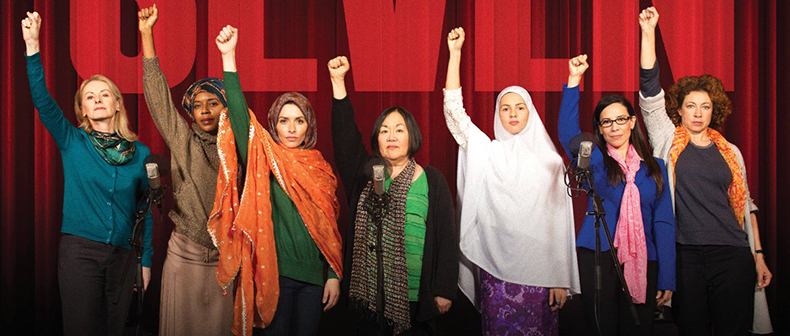Kenan Auditorium shows women-written documentary play “SEVEN”
The theatrical documentary “SEVEN,” presented on Oct. 16 at the Sarah Kenan Auditorium, is an artistic venture written by seven individual writers, each one a powerhouse of innovative vision.
The play was created through the Vital Voices Global Partnership and has been performed in 22 states. It is currently touring the United States until April 5, 2020.
The play combines activism with art. It weaves the true stories of seven individual women from Nigeria, Afghanistan, Guatemala, Pakistan, Cambodia, Russia and Northern Ireland together through the gripping performances of seven actresses; each story was individually written by one of the writers.
The theatrical machinations of the performance itself (lights, sound, set, costume, etc.) are minimal. This is intentional, as to highlight the potent urgency in the performances themselves.
The play is a tapestry of the narratives, musings and traumas each woman faced. Their stories oscillate on the stage. They are told solely through the power of the actresses’ deliverance but aided with a backdrop of images, a subtle, gripping soundtrack as well as the acting of the other six actresses who slip into various roles depending on which story is currently being told.
The result of this layering of voices, is the completed fractal, not only of the harrowing lives each woman lead but of the climate of the world as a whole concerning the respect and livelihood of women.
As the women slip into different roles and accents on stage or say certain lines simultaneously, the audience is made aware of how these stories are woven together. They see the various parallels in the performances and note when lines are said in powerful unison, how pressing each woman’s quest was to her. The sense of each woman’s resilience, despite her sorrow, is felt with each line.
There is Inez McCormack, an Irish human rights and trade union activist who fought in protests and ran a welfare office despite the danger of its location. She became the first female President of the Irish Congress of Trade Unions.
There is Hafsat Abiola, whose father was the president, Moshood Abiola of Nigeria, whose parents were both assassinated. She founded the Kudirat Initiative of Democracy and charged herself with the task of educating young women across Nigeria.
There is Farida Azizi, who trekked through the deserts of Afghanistan to help women in small villages by bringing them simple medical care. She was forced to leave her country after receiving threats of death for her work. Today she lives in the United States furthering women’s rights and peace-building for Afghanistan.
There is Mu Sochua, who was left an orphan from the Vietnam war. She fights against sex trafficking plaguing her country and seeks to restore dignity and peace to its victims. She became the Minister of Women’s Affairs in Cambodia.
There is also Marina Pisklakova Parker who began the first helpline for women who were victims of domestic abuse in Russia.
There is Mukhtar Mai who was gang-raped by four landowners. She rose from the pit of suppression women in her village had been boxed in for centuries and set out to build schools and foster education in Pakistan.
Anabella de Leon, a Guatemalan woman who obtained an education, rose from one of the poorest communities in the country. She became a member of Guatemala’s congress, fighting against corruption and advocating for human rights.
These activists were ordinary women caught in the net of sexism, racism, homophobia, hatred and war. They lost everything most sacred to them but were enlivened from a mad spark of hope that they could inflict change, any change, in the injustice of their worlds.
There was no previously cleared path for them set by other women. They were drowning beneath the institutions and beliefs of their countries. They were forced to pave their own way, to pioneer against the gripping rule of misogyny.
This is primary succession. Life, blooming where there is none.
In the closing of the performance, each woman gave a manifesto on the philosophy of her choices.
“All it takes,” said the actress Ellis Greer who played Inez McCormack, “is one small step. That first step is the massive one.”
The performance of “SEVEN” was gripping, enthralling and stunning. Each actress beautifully portrayed her various roles and swept the audience into the inextricable linkage of the lives of seven extraordinary activists. It is a play you will remember long after the curtain closes and the theater is once again filled with light.











Mu Sochua • Oct 19, 2019 at 5:00 pm
Congratulations to the SEVEN women who portrayed us. Most sincere appreciation and respect.
I just wish to point to your article which refer to me as “an orphan” of the Vietnam War. My parents put me on the plane to pursue higher education in 1972, when I was 18. I left Cambodia for France.
A very well written report of the performance.
Just a note: after some performances, a few of the real Seven sometimes appear for Q/A session. We usually sit in the audience and get on stage when the spotlight is on us. The audience usually expresses very pleasant sounds of surprise.
SEVEN has brought us very close to each other. We continue to hold up her memories of Inez who left us too soon.
To all the women of all ages who stand tall and with their own voice.